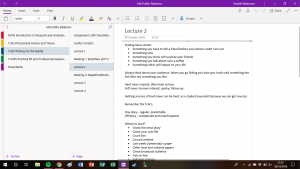By Rachel Measures, BA (Hons) Media, 3rd Year
So everyone has pretty much settled in, and now the real work starts. Soon, but not too soon, many of us will be looking toward our assignments, and in that spirit, I wanted to share some of the ways I have kept myself organised in the last 3 years of university (yes, I am now a Masters’ student, but even I still struggle with this).
1. Little and often.
It’s often said- but working on your assignments just a little bit at a time, every now and again, is much much easier than trying to work on four assignments all in the one deadline week – I mean it seems obvious, but it’s easy to procrastinate and leave things until the last possible second. By spreading things out instead, they are more achievable and much less stressful. Even doing your weekly readings, if your course has them, can help to complete your research quicker when it comes to assignments.
2. Paper notes or word document notes.
Some people like to get all their thoughts down on paper and see everything in front of them, especially if like me, you feel that’s less messy than trying to access files on your computer. When thinking about your lecture notes and readings, you could have a notebook for each module, and then folders for each for all your papers. Of course, you can do this electronically too – whatever you find easier.
3. OneNote is a lifesaver.
This is my new favourite thing! After discussing how we like to keep notes with my course mates this week, it was pretty interesting to see their approaches as many of them have been out of education for a few years. One of them recommended creating a OneNote to keep everything together.
I now have a OneNote for my course split into my modules, and these are split into assignments, lectures and readings. It also means that wherever I go with my laptop, or for working on assignments, I know where everything is.
4. Blogging helps.
It might sound like extra work, but I kept a blog throughout my undergraduate degree. Not only is it good to keep practising your writing, and for potential employers and your CV, its also great for sharing ideas with your course mates, reflecting on your notes, and since we all have devices, it’s a really easy way to make sure your notes are always with you.
5. To do lists should be manageable.
We all love a good to do list, but when it gets too long it can get overwhelming and easier to procrastinate from. When writing a to do list, make sure you form achievable goals for the work you have to do. Maybe split things into small chunks so that you can ensure you finish them.
6. BONUS – Prioritize.
Everyone’s time is precious- life is so busy and there’s only 24 hours in a day. It is not always possible to do everything, and sometimes organisation is simply about knowing what’s important to do right now and what isn’t.





